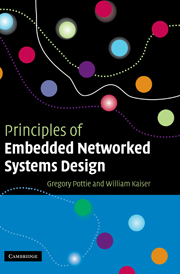Book contents
- Frontmatter
- Contents
- Preface
- Acknowledgments
- List of Abbreviations
- 1 Embedded network systems
- 2 Representation of signals
- 3 Signal propagation
- 4 Sensor principles
- 5 Source detection and identification
- 6 Digital communications
- 7 Multiple source estimation and multiple access communications
- 8 Networking
- 9 Network position and synchronization services
- 10 Energy management
- 11 Data management
- 12 Articulation, mobility, and infrastructure
- 13 Node architecture
- 14 Network data integrity
- 15 Experimental systems design
- 16 Ethical, legal, and social implications of ENS
- 17 Design principles for ENS
- Appendix A Gaussian Q function
- Appendix B Optimization
- Index
14 - Network data integrity
Published online by Cambridge University Press: 10 August 2009
- Frontmatter
- Contents
- Preface
- Acknowledgments
- List of Abbreviations
- 1 Embedded network systems
- 2 Representation of signals
- 3 Signal propagation
- 4 Sensor principles
- 5 Source detection and identification
- 6 Digital communications
- 7 Multiple source estimation and multiple access communications
- 8 Networking
- 9 Network position and synchronization services
- 10 Energy management
- 11 Data management
- 12 Articulation, mobility, and infrastructure
- 13 Node architecture
- 14 Network data integrity
- 15 Experimental systems design
- 16 Ethical, legal, and social implications of ENS
- 17 Design principles for ENS
- Appendix A Gaussian Q function
- Appendix B Optimization
- Index
Summary
The goal of a sensor network is to answer particular questions about the physical world for the users authorized to pose such questions. Implicit in this statement are a number of factors that are common to the security of networks and others that are particularly important in sensor networks:
secrecy – denial of access to information to unauthorized users;
authenticity – validation of the source of messages;
integrity – messages are not modified accidentally or maliciously;
anonymity – information retrieved minimally reveals the identity of groups or individuals not the subject of a query;
flexibility – a broad set of queries can be posed and this set can grow in time;
scalability – the network can scale to large numbers of nodes and users;
robustness – the network can resist resource-draining attacks.
The first three factors are conventionally dealt with in a security framework involving encryption, whereby private messages can be exchanged between one or more parties. However, in a sensor network context there is also the question of reliability of the information received since a malfunctioning source can potentially corrupt a great deal of information. Additionally, nodes placed in the open may have less physical security than is typical with computers, increasing the possibility of secret keys used in encryption being revealed. Dealing with this is closely connected with the question of calibration of sensors and trust relationships between different entities.
Information
- Type
- Chapter
- Information
- Principles of Embedded Networked Systems Design , pp. 439 - 462Publisher: Cambridge University PressPrint publication year: 2005
